#nnnnot sure what the next topic will be
Explore tagged Tumblr posts
Text
Digging Graves for your Morals; Or, The Ethical Problem of Outlawry
Hello, yes, I am here again. This one is shorter, I swear (it’s under four thousand words, even). If this is the first post from me you’re seeing, this is a follow-up to my prior essay posted here on the game The Coffin of Andy and Leyley, although it should be able to mostly stand alone.
At the end of my last essay, I touched on both the game’s nearly uncompromising moral scepticism and relativity, but I didn’t really dig into it. I outlined that the game only textually frames actions as ‘morally bad’ in the context of a morality set by the society and the world that has treated them as no better than farm animals raised for the slaughter. Well, I have a lot to say on the topic of ethics on the topic of The Coffin of Andy and Leyley, so buckle in, this one’s going to talk about the social contract, moral scepticism and everyone’s favourite topic: Mrs. Graves.
As usual, this was originally posted and formatted for on Sufficient Velocity and you can perhaps more easily read it there. Spoilers abound, and my content warning from last time still applies.
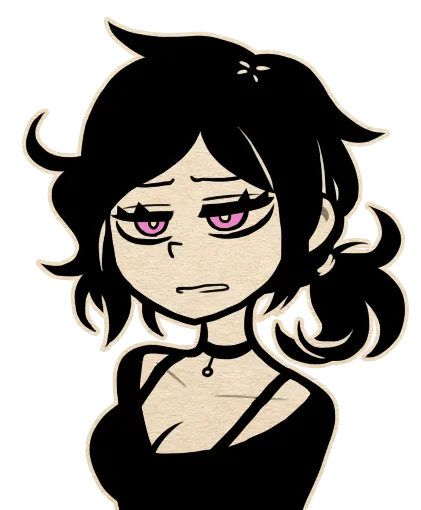
She’s not too hot on either ethics or her mother
The Meat of the Matter
Since a lot of this is optional or otherwise missable information, let’s review the premise the game gives us. If you’re already aware of all of this, I apologise, it won’t take long.
First off the bat, the quarantine at the start of the game was a hoax-driven money-making scheme of which you can pick up more-or-less all the relevant details of. This is entirely missable and by the time it’s possible to discover, our protagonists have better things to dwell on and have dialogue about, so I’ll give you a summary of what you can deduce from reading the notes and thinking about it.
The quarantine is an organ harvesting operation, as per some documents you can discover in the wardens’ office. They entrap the residents, test their blood types and starve to death those they deem surplus to requirements — alternatively the starvation itself could be their method of ‘preparing the harvest’, there’s evidence in both directions and it hardly matters — harvesting the organs of the others for sale. As our protagonists are AB-typed, the ‘universal recipient’ or ‘most selfish blood type’, they’re some of the first on the chopping block.
If you read through the newspapers and the documents in Mr. Washing Machine’s car, you can discover that ultimately ToxiSoda are responsible, and a similar thing is happening in a different city under the guise of a ‘chemical leak’. Should you further investigate matters, you will find mentions of the ‘man behind it all’, the doctor, or the Surgeon, as the fandom have been referring to him — you may recall Mrs. Graves mentioned someone similar! Yeah, he’s the guy who runs ToxiSoda, who are themselves partners with the water company that faked the parasite outbreak in the first place.
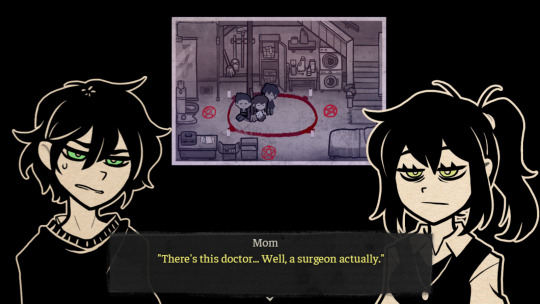
It’s all a life insurance scam, apparently
How much the details of the operation matter is something open to interpretation — it might just be something for players to figure out and Episode 3 will not cover the Surgeon at all, or he might play a major part; it's not particularly relevant to this essay. What matters is that it happened at all — indeed, it’s fairly easy to justify Ashley and Andrew in everything they did in Episode 1 (flashbacks aside), arguing that if they’d made any other decisions they’d have died — an argument that the victims dug their own graves, even if the Graves siblings put them in them. How correct that is is a matter of debate, but that you can make the argument at all matters, and we’ll be returning to this later. In my last essay (and again in the introduction here), I made an analogy to farm animals, raised without love and for slaughter. Let’s put a pin in the ‘for slaughter’ part for now and take a look at the ‘without love’ part.
That’s right, it’s time to meet the parents.
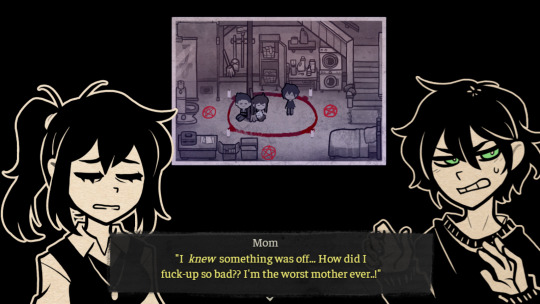
As Andrew notes, there are significantly more compelling reasons for you to say that
They Fuck You Up, Your Mum & Dad
They really do.
Our charming protagonists are, as with many things depicted in this game, an exaggerated, almost farcical example of this phenomenon — one that’s just grounded enough to still feel very real, just like the siblings themselves.
The late and lamentable Mrs. Graves is just the same: originally a teen mother, hopelessly out of depth with two difficult children — even if one was good at masking it — and an unreliable, emotionally unavailable (at least to their children) partner who can’t hold down a job, ends up foisting them off on each other and doing a Parental Negligence because she simply Cannot Cope. That’s the real part. The part where she gets paid off by an organ harvesting operation to leave them to die, that’s the borderline-farcical exaggeration that throws all the nooks and crannies of her character into sharp relief.
Mrs. Graves does not have a good relationship with either of her kids. Having self-admittedly fobbed the job of raising Ashley off on her son, to the degree that they did not even celebrate her birthday as kids, both of them hold differing degrees and types of resentment for her.
For Ashley, it’s hate — perhaps not quite so clear cut as that, as it’s her that calls for the eulogy and she shows some potential signs of discomfort while cleaning up her parents’ corpses, but by and large, it’s fairly simple and straightforward, as usual for Ashley. The sentiment is not exactly unreturned, either.
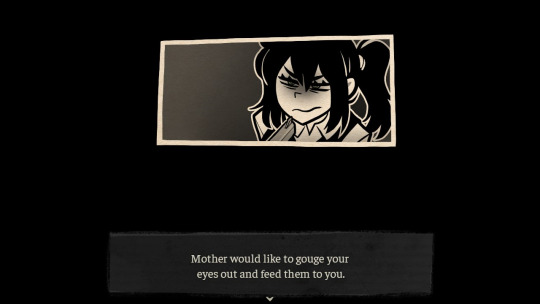
This brings Ashley’s heart great delight!
The most clear incident raising her from everyday ‘neglectful’ to ‘wow she wanted nothing to do with this kid’ is the optional ‘birthday cake’ scene, obtained by finding the present in Ashley’s first ‘transitory world’ dream, in which we see Ashley’s birthday and the founding of a lemon cupcake tradition between Leyley and Andy. She has received nothing from her family, notes that her ‘friends’ would say they were busy before she even told them the schedule and Andy takes her out to buy cupcakes with his pocket money.
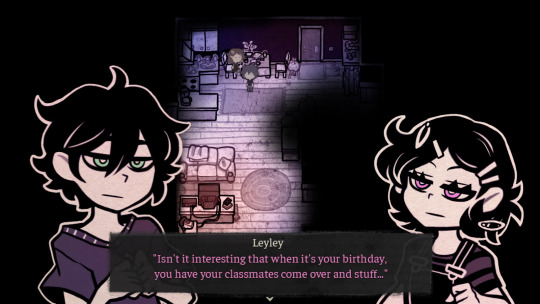
This scene gets a callback in Andrew’s dream later. Just remember to Ask Nicely, rather than Kill Her.
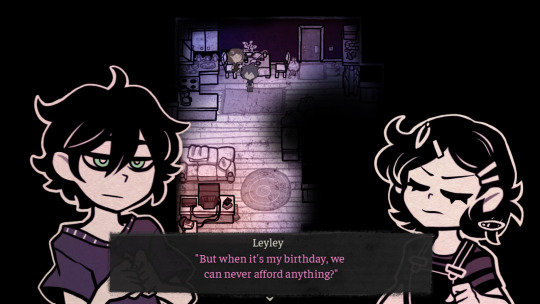
Parents of the year, everyone.
So with Ashley it’s as straightforward and obvious as she herself is — she hates her mother, her mother hates her. With Andrew, as with Andrew himself, it’s a fair bit more complicated. His mother is a much more nuanced figure, who is believable in her role as an unfortunate teen parent who was trying her best. He has a degree of trust in her against, seemingly, his own good judgment In her conversation with Andrew, she acknowledges her fault in raising him and seemingly sincerely tries to offer him a ‘way out’, an olive branch.
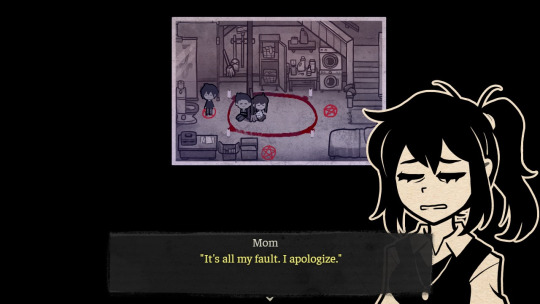
I think many people have had relationships where they might say this
This scene in particular intrigues me, because she is acknowledging fault in a way that Andrew strictly avoids doing — and well, there’s nothing Andrew likes more than a good way to avoid acknowledging any fault of his own. With her dominant relationship over their father as a model for Andrew to draw comparisons to his own relationship with Ashley with, it’s no surprise that the narrative resonates with him to the point of ‘Accept’ being many people’s first completion.
Of course, that’s not all there is to it. There is a fascinating contrast with her later conversation with Ashley, where she — despite accusing Ashley of brainwashing Andrew — refers to Leyley and Andy as ‘two psychos’ and states that she always knew they were responsible for Nina’s death and that, implicitly, they owe her for not turning them in.

There's something about mother-daughter relationships here that I just do not have the time or reading to dig into, unfortunately.
Meanwhile, when Andrew interrogates her on her possession of their death certificates, she has… an interesting, plausible story about a life insurance scam and claims that she really did think they died in the fire, implicitly denying the claim that she sold them. It’s entirely possible that she’s describing the details of the ‘scam’ correctly — you can even buy that she genuinely does care for Andrew in some way, if not Ashley, but her claim about being an honest, grieving parent shocked at their deaths… doesn’t add up?
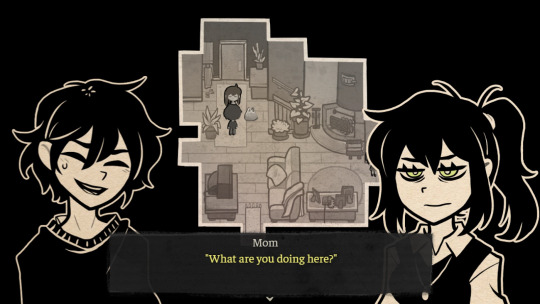
This is a very normal reaction to your supposedly dead children showing up in your house.
As Andrew himself notes after hearing her story, she’s full of shit. This gets into speculation, because there are a few ways to read this, but the most plausible ‘gist’ is that she and her partner were paid off in money and jobs to not raise a fuss — the surgeon she mentioned is almost certainly the founder of ToxiSoda, remember?
The overwhelming difference in presentation between how she speaks to Andrew and Ashley invites investigation — and when Andrew turns down her offer and tells her he isn’t interested in her offer in Decline, her reaction isn’t… despair, it’s shock — and well, there’s a good reason for that.
Why do you think she did it in the first place?
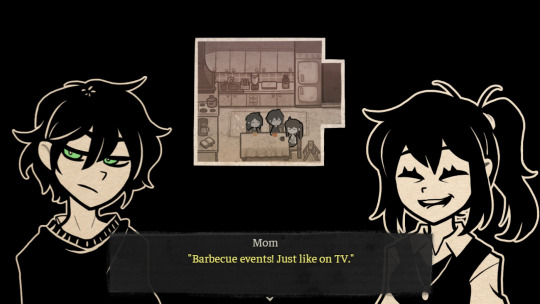
This is the happiest we see her
Well — it’s so she can finally fit into society. That white picket fence, that idyllic 1950s life — hell you can call it the American Dream. She wants that, or as close to it as she can get — the working-class teen mother, living in poverty, aspiring to the middle-class. It’s a very common, very real and very grounded motivation.
And to that end, she effectively sold off her children. It’s no wonder she can’t fathom why Andrew wouldn’t choose the same.
That’s the part that makes you think — just like the deaths in Episode 1, well- maybe the siblings are justified here, too. It’s a weaker argument, but it’s still one you can make under many common moral paradigms today — what goes around comes around, all that jazz. Just look at how awful she was to Ashley.

She’s finally found what she’s been striving for.
Here’s the thing, here’s the thing though — what, reasonably, could she have done? Andrew and Ashley briefly highlight this in conversation about Ashley’s ‘friends’ in Episode 1 — was she supposed to fight gunmen to try and break them out? Throw food to the balcony from four stories?
Moreover, as she herself says to Andrew… would anyone really have been able to do better than her in her position? She was seventeen when Ashley was born, living in poverty with a partner who couldn’t even remember Andrew’s name when he was a kid. Anyone would have had difficulty, let alone with these kids.
Her evils are — they’re not any deliberate action, but rather… prompted inaction. She didn’t have the emotional energy, resources or plain capability to properly parent her children, she didn’t have any solutions to their murder of Nina in a state so blatantly hostile to its underclass, she didn’t have a way to connect with Ashley and she took the money rather than fight a futile and likely suicidal battle against a corporation and its armed goons in a dystopian setting.
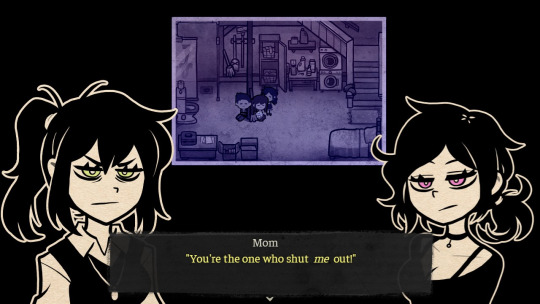
Ashley, notably, does not deny this.
Her sin is the one we’re all, I think, guilty of — that of not trying hard enough, that of inaction in the face of difficult tasks, of not standing up on principle because it’s just too much that day and you don’t have the spoons, you’ll do it tomorrow (no you won’t). It’s a petty, everyday kind of evil — that of not doing enough.
Is that enough to condemn her? Certainly, there’s a pretty manipulative read of her that likely has some truth to it — in the locked door in Ashley’s dream in ‘Decay’ you can discover that she has a ‘not-hatched’ tar soul — but consider that lens — the game won’t make up your mind for you, so you’ll need to choose that for yourself.

The dad is interesting in terms of negative space — but he’s mostly important in that he doesn’t matter, so I decided to not fit him in here. He has art, though — just no sprite, because, well, he’s never mattered to either sibling.
The Contract We Call Society
Right, it’s time to get a little bit Theoretical in here. Not much, but a little. Social contract theory is a complex topic with a lot of nuance, much of which I will be eliding in the name of not writing a twenty thousand word paper on semiotics, law, and anthropology, but the short analogy is… the idea that as long as you play by society’s rules, as long as you are a good citizen, a good person, the state, or the community, will take care of you.
In a number of ways, the harshest penalty levied by many historical states and legal codes was not death, but rather the criminal status of outlawry, a practice that’s cropped up a number of times in history — the practice of no longer being protected by the law. This meant one could be killed or worse with impunity — you were no longer protected by mob justice and, while overexaggerated as a term of reference, certain texts from Medieval England refer to outlaws as bearing a wolfshead, ‘for the wolf is a beast hated by all folk’. Never minding that wolves are actually delightful, this was a time when wolves were actively hunted and sold by people — and the same was intended to happen to outlaws. They were ‘fair targets’ as far as society was concerned, no longer to be treated as your fellow citizens.
This was the gravest punishment on the books, for most of these legal codes — something saved for those who had broken the social contract so completely that there could be no turning back (civil outlawry is… a bit different, that’s not the topic here). Among others, a modern critique of the concept is that it offers no incentive for improvement, no incentive to change or to cease harming society — if an outlaw has none of the social contract’s protections, what reason do they have to obey… any of the social contract? If that seems familiar, well, let me ask you this:
What if the state or community fails its end first? What responsibility does the innocent outlaw have to that contract?
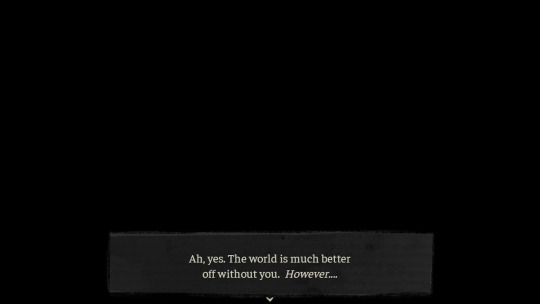
It’s an interesting phrasing, that the world is better off.
It’s time to talk about the incest, and part of why it’s there. The cannibalism too, but that’s less impactful here. If you’ve seen me elsewhere, you might have seen me say that the incest is a load-bearing narrative pillar — in large part due to it being a critical facet of the siblings’ relationship, but in another large part due to it being an equally critical part of how the game uses taboo.
A taboo is in this context something that is considered repulsive and to be avoided by society. It’s a more complex term than that — you can also use it for certain sacred actions or utterances that are only permitted to certain people, for example — but that’s what it is here. Swearing, premarital sex, BDSM and murder are, approximately from weak to strong, some example taboos held in modern Anglospheric society.
Strong taboos are a staple of horror — they shock, they disgust, they draw people’s attention and it’s that last one that’s critical here. Incest is a very strong taboo — while I am absolutely not segueing into its historical context, the very well-established Westermarck effect gives it a certain timelessness and immunity to desensitisation that most other taboos don’t have — murder, to contrast, is a taboo we’re largely desensitised to in modern media and works of modern media have to put in actual work to make a murder seem horrifying — through atmosphere, cinematography, evocative prose etc.
And this is important because the use of taboo I’m covering in this essay is that the incest is used to invite judgment — it is so ingrained as a ‘wrong thing’ in people’s brains almost regardless of background that it forces the player to engage with the work morally. And that’s where the fun starts.
I’ve mentioned before, very briefly, about the juxtaposition of tone between the Burial & Decay endings, contrasting with the very monstrous difference in morality. Burial is remarkably light-hearted — they play around with the drain blockage, they joke about their mother’s personality and this is further exaggerated on the Love path, where Andrew is much more comfortable with casual contact and the two make a game out of how far they can throw their parents’ skulls, the humour is directly contrasted against their abhorrent actions.

I’ll be real Ashley is far more merciful than I, I’m shuddering at the thought of that gunk in my hair
In comparison, Decay is… bleak. I’ve seen it being referred to as being ‘emotionally sandblasted’ and, yeah I think that’s fair — it’s uncomfortable, it’s heavy and it’s just not fun. And this is the route in which, if you chose Trust into Accept, Andrew has bought into the narrative that his mother’s offered — that he can fit just fine into society if he wasn’t stuck, if not for Ashley — the route that ‘fits’ most closely to the social contract, to Andrew feeling the guilt that we think he should and hating the monsters that they’ve become, as the social contract deems them. Given the pains the game takes to attach the player to the protagonists, this normative moral ending is very easily interpreted as the bad ending.
And well, isn’t it?
Thing is, as mentioned above, the social contract has never held up its end for them. The game takes careful pains to point out to a viewer that they’ve never had the life that society promises people, so why do its moral standards apply?
The game invites you to judge the characters, and in the same motion, asks you from what principles you judge them, making a pretty good guess in that, like most people who haven’t spent a large amount of time navel-gazing and reading some very boring books by very dusty old men, they come from the society around you.
Love even has Ashley express this sentiment directly after the incestuous dream — she asks you — well, Andrew, but this is also something for the player to mull over — why this is what’s engaged your morality or sense of revulsion, rather than the desecration, cannibalism or murder.
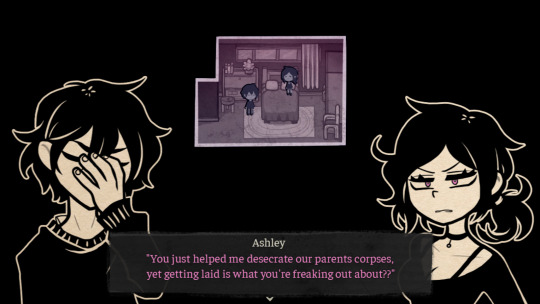
Andrew and Ashley are both very funny and very fascinating in this scene.
And that’s the framing that it casts all of its own moral judgement in — even the ‘tar-soul’ aspect is… well, it’s unclear what it even means. Mrs. Graves was a ‘not-hatched’ tar soul, after all. Other than that, it’s society and the world being better off without them, rather than any kind of assertion of objective morality. Due to the present of ‘soul colour’, we’ll presumably see the game make some moral statements in Episode 3, but as it stands?
It’s nearly completely morally sceptical, in and of itself — it’s not interested in moral assertions or education, it’s interested in making you question your own morals. Deconstructive (not that kind), rather than dialectic, to be mildly pretentious.
It uses taboo and shock to invite moral judgement, but then uses tone, charm and our instinct to look for the happiest end for our blorbos to get you to recognise that these are principles you yourself brought into the game, rather than any it’s handed you.
To summarise: you’ve brought these principles in from society, but what do the siblings, the protagonists, the villains to the world, owe society? Enough that they should follow them? It failed them first, after all.
Closing Thoughts
This one is a bit less energetic than the last, tragically — my sleeping schedule is the stuff of nightmares recently, I love windy weather. Wait, no the opposite. Huge thank you to everyone who commented on the last one, you are the wind beneath my wings and the main reason I managed to get this out this week.
This essay is a bit more interpretative than my last one — certainly, there are alternative readings and I’ve been toying with the idea of deliberately taking a reading I don’t like very much and writing from that perspective as a demonstrative exercise recently — mostly that you shouldn’t just take my word for things!
Otherwise, if the last bit at the end seemed murky, I apologise — I did try to write a more detailed version, but firstly, it was three thousand words and secondly, I re-read it the next day and I could not understand what the fuck I was talking about. Personally, I blame Derrida — suffice to say that I strongly recommend playing through it with an eye towards considering culpability, morality and why you think certain characters are more or less forgivable than others, and for what deeds. See what you get out of it.
I managed to keep one particular thread open to wrap up with here — I try to keep speculation on Episode 3 content to a minimum in the main essays, but it should be fine here — you might have noticed that I refer to Episode 1 and Episode 2 being on something of a spectrum of justifiability, with the siblings’ actions being ‘more’ justifiable in Episode 1 and ‘less’ justifiable — but still justifiable if you try — in Episode 2.
To continue the thought of the happiest ending being the one in which they step the furthest away from common morality and to further jar the viewers’ sense of morality by contrasting societal morality and blorbo-oriented morality, Episode 3: Burial could continue this trend in having a major victim be someone who, well, has done nothing wrong and isn’t even guilty of bystander syndrome.
I wonder if there’s any good candidates, someone who’s sweet, harmless and will indisputably be an innocent victim…
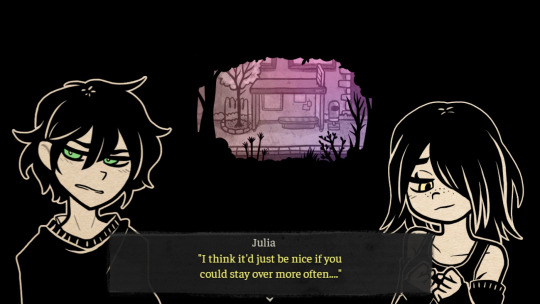
…I’m sure she’ll be fine
#the coffin of andy and leyley#tcoaal#analysis#essay#ashley graves#andrew graves#mrs graves#nnnnot sure what the next topic will be#might do a deranged take on purpose#this one and the last one have been very grounded#I'll get to my asks tomorrow#probably#I've been busy sorry
504 notes
·
View notes